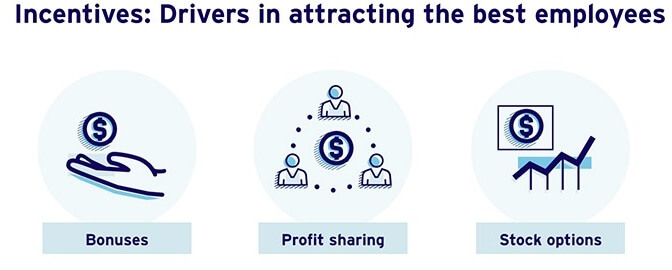Human Resource Management – Compensation And Rewards
Compensation And Rewards

One of the Basic objectives of Human Resource Management is to recruit employees into the organization and deciding the Compensation and Rewards to be given to them.
Compensation and Rewards include planning pay and benefits to be given to employees and it involves many decisions, often complex and based on knowledge of a multitude of legal requirements. An important decision is how much to offer in salary or wages, as opposed to bonuses, commissions and other performance-related pay. Other decisions involve which benefits to offer, from retirement plans to various kinds of insurance to other more intangible rewards such as opportunities for learning and personal growth. All such decisions have implications for the organization's bottom line, as well as for employee motivation.
Different Compensation Strategies adopted by Organizations:
- Basic Pay: Basic Pay refers to the amount an employee gets working every hour. It is the permanent amount that he will always get while working. Basic Pay is the most simplified structure. It can be accompanied by other compensation techniques as well. For e.g. a worker gets $15for every hour he works. If he works 20 hours every week; he will be entitled to $300 every week plus he will get the additional wages for the additional hours he works which will be based on the agreement the employee and employer entered into.
- Performance-Based Pay: According to this method the pay of the employee will be based on the level of performance he delivers. Such method can be based on the quantity an employee produces or the quality he delivers. For this method, different kinds of performance evaluations are done and the compensation structure is framed for the employee. For example, an employee gets $5 for every product he makes, provided the product matches the required standards. Various rates can be fixed to the quality of the product as well i.e. Superior Quality, Substandard product, Defected product etc.
- Incentives: Incentives refer to the various methods of extra benefits given to the employees to give them motivation and boosting their morale. There can be several incentive policies in the business to boost the sales and production of the business. Some incentive techniques are:
- a) Bonus: A bonus can be given to the employees based on the performance given by them. If an employee gives a superior quality performance and is benefitting the business more than what business is incurring on him; the business can decide to give him some bonus which could be monetary or in kind.
- b) Profit Sharing: Sometimes businesses give an opportunity to the employees to share profits in the firm. This is done to motivate the employees and to align their goals with the firm’s goals. If the firm’s profits increase; it will ultimately increase the employee’s incentive.
- c) Stock Option: The businesses give the employees an option to buy the shares in the company at reduced prices. This is known as Employee Stock Option Scheme or Employee Stock Purchase Plan where the company sells the share to the employees at a price lesser than the market price.
- d) Commission: Sometimes the employees are paid a certain fixed amount of commission for acting as the salesperson of the company or they can be paid a percentage of the sales they make for the company.

- Pension Schemes and Retirement Benefits: This includes the various policies set by the business for paying out some benefits to the employee on his retirement or discontinuation in the business. These can include the pension structure for the employee, gratuity payment, provident fund, voluntary retirement compensation, retrenchment compensation, provident fund contributions etc.
- Benefits in Kind: This refers to the benefits given by the business to the employee to which a monetary value can be assigned. These help in motivating the employee to a large extent. Various kinds of Benefits in kind are: rent-free accommodation, gifts, vouchers, free meals, medical services etc.
Compensation Strategy:
Compensation Strategy refers to the planning of the technique to be followed to pay remuneration to the employees. While formulating the strategy a Company must ensure that it does not undermine the interest of the employees and the payment to the employees is in accordance with the efforts put by them. In no case, the Compensation Strategy should be prejudicial to the laws and regulations.

Why is Compensation Strategy designed?
A compensation strategy in a company serves various purposes. It has to be designed very carefully. It helps to achieve the following objectives:
- Retain staff: The most important objective of Compensation strategy is to remunerate the employees for the services provided by them. If the business is not able to pay the employees for the services provided by them; it will be a huge drawback for the firm. It will result in high employee turnover in the company and it will not be able to retain the skilled employees in the business. The good compensation policy helps the business in attracting new skilled employees. The better the strategy, the more satisfied the employees will be and it will help the business to maintain a good rapport with other company’s employees.
- Motivate employees: A good compensation strategy results in good employee satisfaction. Time-to-time hikes in the salary, incentives, bonus etc. results in the morale-boosting of the employees. The profit-sharing technique keeps the employee focused on increasing his productivity because it will eventually benefit him. Thus, the business needs to build strong policies so as to motivate employees because motivation is a big force to trigger the business development.
- Align employee’s expectation with organization’s goals: A proper compensation policy helps the employee to realize that the business is concerned about his own personal needs. This helps in aligning the employee’s goals with that of the organization. They both need to go hand in hand so as to achieve personal and organizational growth.
- To comply with the law: Sometimes the remuneration or incentive techniques of the businesses are governed by the law and regulations. Several labor laws and regulations specify the remunerations to be paid by the organization. Some Acts specify the mandatory payment of Pension, Gratuity, and Provident Fund upon the retirement of the employee. Thus, it becomes mandatory for the business to form certain compensation policies.
Need more help on HRM Assignment? Assignmenthelp.net is the solution to it.
For more info regarding the concept of Accepting Special Orders visit assignmenthelp.net. The ascertainment of appropriate Compensation and Rewards techniques and understanding their applicability can be complicated and tactical. But we are here to help you out with your queries. You can take online classes form our teachers who are best and professional in their respective fields. They will take your doubts and help you in the better understanding of the topics. You will have a better grasp of the topics. We take care of the aspect that you can’t loose on marks and need to score well. The teachers will help you get good grades. You can also talk to our customer care executives in case you have any query regarding the procedure. We are available here 24*7 at your service. You can do a live chat with our executives and get your queries solved.
We also provide Assignment Help. You can get school and college assignments done. All you need to do is just upload the assignment with a deadline and we will deliver the assignment before the deadline. There are many service providers in the market but what distinguishes we from others is our dedicated efforts and quality work. You will get the best services here and our quality assignments will help you score well.
We provide premium services at the lowest rates. Contact us for:
- Plagiarism free content
- On-time delivery
- Expert content
- Live Chat
- 100% satisfaction
So what are you waiting for? Visit assignmenthelp.net now and have a look at some of our other assignments as well.


